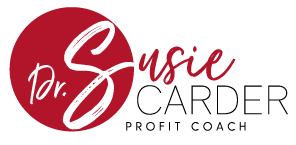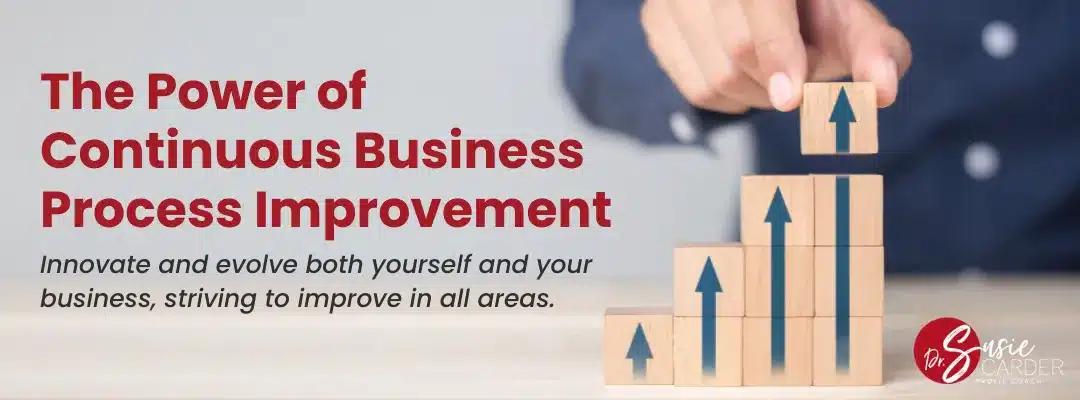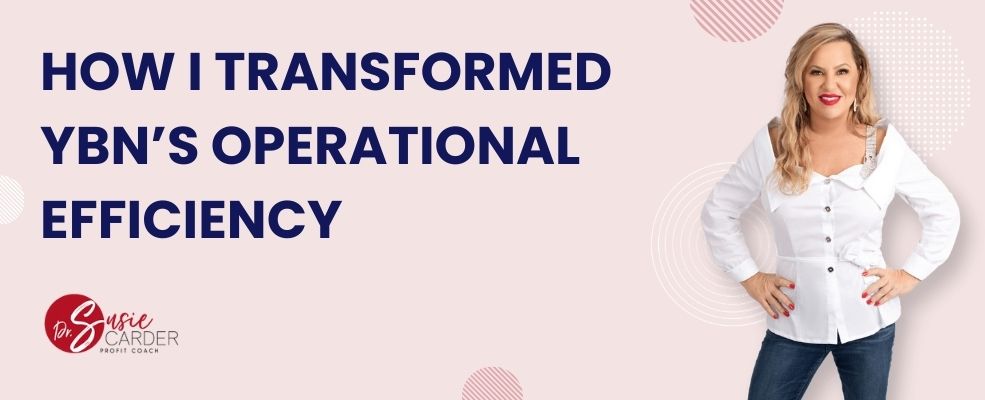Continuous business process improvement is not just a strategic move—it’s a survival necessity. The business landscape is in a constant state of flux. Emerging technologies, market trends, and consumer behavior shape and reshape it. Adaptation is not just an option; it’s an imperative.
Businesses that want to stay ahead of the curve must commit to continuous improvement. You need to fix what is broken and enhance what works. Innovate and evolve yourself and your business, striving to improve in all areas. This is the power—the absolute necessity—of continuous business process improvement.
The Value of a Committed Coach in Business Process Improvement
A committed coach plays a crucial role in business process improvement. They bring expertise, guidance, and support to organizations seeking to enhance their operations and achieve sustainable success. Coaches use their expertise to give helpful advice, creating plans that can greatly enhance different aspects of a business.
A business coach can identify areas of inefficiency or underperformance. Using thorough assessments, coaches pinpoint specific processes or practices that are hindering productivity or growth. This diagnostic approach helps develop targeted action plans tailored to the unique needs and goals of your organization.
Case studies provide compelling evidence of remarkable success with the help of a committed coach and active CEO involvement. These real-life examples demonstrate the impact a coach can have on an organization’s performance. By working closely with a coach, businesses have been able to streamline their operations, optimize resource allocation, and improve overall efficiency.
In one case study, a manufacturing company struggled with lengthy production cycles and high costs. Hiring an operations coach allowed the business to identify bottlenecks in processes and implement lean manufacturing principles. This resulted in significant reductions in lead times, increased throughput, and improved profitability. The coach’s expertise in process optimization and change management played a vital role in driving these positive outcomes.
Another case study involved a small business in the service industry that was facing challenges in customer retention. Their operations coach analyzed their customer journey, identified pain points, and developed strategies to enhance customer satisfaction. Through the implementation of personalized customer service initiatives and targeted marketing campaigns, the business experienced a notable increase in customer loyalty and repeat business.
These examples highlight the tangible of a committed coach. Improvements in performance and efficiency should have a near-immediate impact. Meanwhile, a good operations coach will foster a culture of continuous improvement within an organization. They empower employees to take ownership of their work and encourage a mindset of innovation and growth.

The Dynamic Nature of Business
In today’s fast-paced world, businesses face constant challenges in remaining competitive, including effective business process management. Improvement is crucial for businesses to not only adapt but also stay ahead of the curve.
Recognizing the importance of life-long learning contributes to long-term business success. As the business environment continues to evolve, the skills and knowledge required for success also transform. Lifelong learning empowers professionals to stay updated with the latest industry trends, acquire new skills, and foster innovation. By continuously learning, individuals can broaden their perspectives, think critically, and make informed decisions.
Embracing the dynamic nature of business is not only necessary for survival but also for growth. By staying agile and continuously learning, businesses can identify emerging opportunities, anticipate challenges, and proactively pivot their strategies to stay relevant. This approach helps businesses stay ahead of the competition and use the changing landscape to their advantage.
Strategies for Continuous Improvement
- Encourage your employees to embrace a growth mindset and prioritize ongoing learning and development. Businesses can achieve this through a range of initiatives that support and empower employees in their professional growth.
For example, organizations can provide regular training opportunities that cover a wide range of topics. Additionally, promoting knowledge sharing within teams can foster collaboration and create a supportive atmosphere where individuals can learn from one another’s experiences and expertise.
- Establish a systematic approach that involves regularly identifying areas for improvement and implementing changes to optimize efficiency and effectiveness. Evaluate existing processes and gather feedback from employees. Then implement targeted solutions that streamline workflows, enhance creativity and productivity, and improve processes.
Example solutions may include adopting new technologies, automating manual tasks, or redesigning standard processes to eliminate unnecessary steps.
- Organizations can also benefit from implementing Total Quality Management (TQM). TQM is a management approach that focuses on continuous improvement and customer satisfaction. With TQM, employees at all levels of the organization help deliver improvements.
Total Quality Management emphasizes the importance of quality at every stage of operations, from design to delivery. Improvements can include processes, products, services, and the overall culture.
Help your business adapt to market changes by promoting growth and innovation. Continuous improvement creates a flexible, responsive environment.

The Sustainable Growth Model
Implementing a sustainable growth model necessitates a holistic approach. In this section, we will delve into the key benefits of a sustainable growth strategy.
One of the main benefits of continuous improvement is increased efficiency. By identifying and eliminating inefficiencies in workflows and operations, businesses can optimize their resources and reduce waste. This not only improves productivity but also contributes to cost savings and profitability.
Another fundamental tenet of a sustainable growth model is customer satisfaction. Customer experience plays a pivotal role in determining business sustainability. A continuous business process improvement model inherently prioritizes customer needs and expectations, striving to provide superior experiences that foster loyalty and retention.
Finally, a sustainable growth model fosters resilience. A resilient business not only withstands challenges but learns from them. Resilience drives operational sustainability, allowing businesses to maintain continuity and reliability, even under pressure. Therefore, fostering resilience across all levels of the organization is an essential component of a sustainable growth model.
In conclusion, the sustainable growth model transcends the traditional business approach, prioritizing continuous business process improvement, customer satisfaction, and resilience. This holistic model ensures businesses remain competitive, efficient, and responsive to changing market dynamics.
Unlocking Success with Continuous Business Process Improvement and Insightful Coaching
Continuous business process improvement is a vital aspect of maintaining a successful, competitive business. This approach not only optimizes efficiency and effectiveness but also encourages a culture of constant learning and adaptability.
A committed coach pushes businesses to assess and improve their operations, fostering innovation and resilience. Businesses can stay ahead of market changes by focusing on getting better all the time. They can also meet customer needs and turn setbacks into chances for growth and learning.
In this journey of continuous improvement, the role of a knowledgeable business coach is invaluable. An experienced coach understands the dynamic nature of business and the importance of lifelong learning. They can provide guidance, insights, and strategies tailored to your business’s specific needs and industry trends.

- Keep Cash Flowing In
- Build a Foundation for Long-Term Profitability
- Learn to Thrive No Matter What Happens
Working with a coach who values always learning and improving provides a multitude of growth opportunities. Your coach’s expertise drives your business towards sustainable growth and long-term success.
Are you ready to revolutionize your business? I’m here to be your guide in navigating the dynamic landscape of business process improvement. My experience and commitment to lifelong learning can help uncover new opportunities for growth and success in your business.
Start your journey today by filling out my Get Started Questionnaire. We have designed this questionnaire to help us understand your unique business needs and goals.
Or, if you’re interested in evaluating your current business performance, take our 10-Point Assessment. This assessment will provide a detailed insight into your business’s strengths and areas for improvement.
Don’t wait for change to happen, be the change! Start your journey towards continuous business process improvement today.






